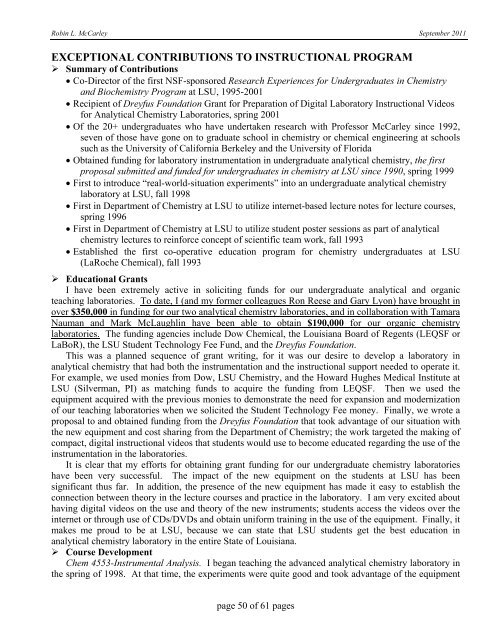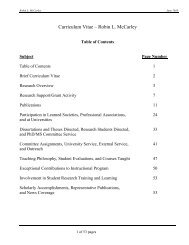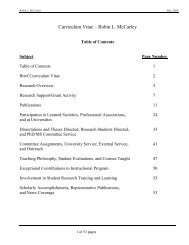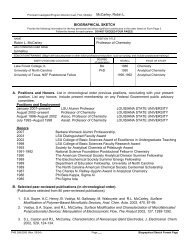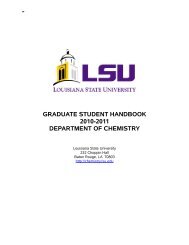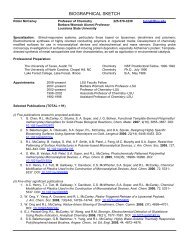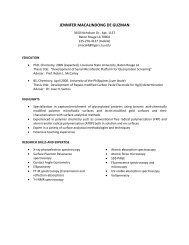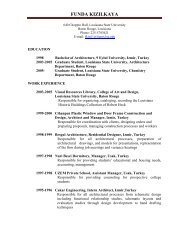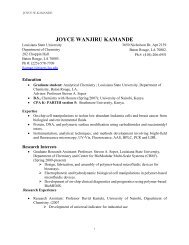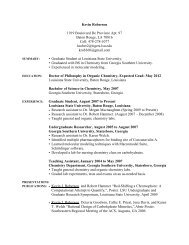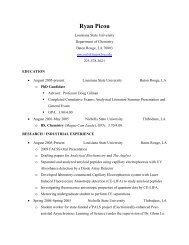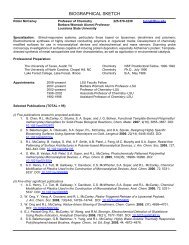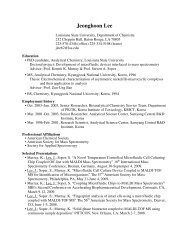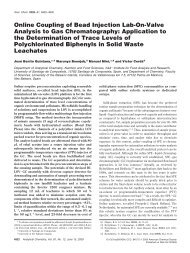Curriculum Vitae – Robin L. McCarley - LSU Department of ...
Curriculum Vitae – Robin L. McCarley - LSU Department of ...
Curriculum Vitae – Robin L. McCarley - LSU Department of ...
Create successful ePaper yourself
Turn your PDF publications into a flip-book with our unique Google optimized e-Paper software.
<strong>Robin</strong> L. <strong>McCarley</strong> September 2011<br />
EXCEPTIONAL CONTRIBUTIONS TO INSTRUCTIONAL PROGRAM<br />
Summary <strong>of</strong> Contributions<br />
Co-Director <strong>of</strong> the first NSF-sponsored Research Experiences for Undergraduates in Chemistry<br />
and Biochemistry Program at <strong>LSU</strong>, 1995-2001<br />
Recipient <strong>of</strong> Dreyfus Foundation Grant for Preparation <strong>of</strong> Digital Laboratory Instructional Videos<br />
for Analytical Chemistry Laboratories, spring 2001<br />
Of the 20+ undergraduates who have undertaken research with Pr<strong>of</strong>essor <strong>McCarley</strong> since 1992,<br />
seven <strong>of</strong> those have gone on to graduate school in chemistry or chemical engineering at schools<br />
such as the University <strong>of</strong> California Berkeley and the University <strong>of</strong> Florida<br />
Obtained funding for laboratory instrumentation in undergraduate analytical chemistry, the first<br />
proposal submitted and funded for undergraduates in chemistry at <strong>LSU</strong> since 1990, spring 1999<br />
First to introduce “real-world-situation experiments” into an undergraduate analytical chemistry<br />
laboratory at <strong>LSU</strong>, fall 1998<br />
First in <strong>Department</strong> <strong>of</strong> Chemistry at <strong>LSU</strong> to utilize internet-based lecture notes for lecture courses,<br />
spring 1996<br />
First in <strong>Department</strong> <strong>of</strong> Chemistry at <strong>LSU</strong> to utilize student poster sessions as part <strong>of</strong> analytical<br />
chemistry lectures to reinforce concept <strong>of</strong> scientific team work, fall 1993<br />
Established the first co-operative education program for chemistry undergraduates at <strong>LSU</strong><br />
(LaRoche Chemical), fall 1993<br />
Educational Grants<br />
I have been extremely active in soliciting funds for our undergraduate analytical and organic<br />
teaching laboratories. To date, I (and my former colleagues Ron Reese and Gary Lyon) have brought in<br />
over $350,000 in funding for our two analytical chemistry laboratories, and in collaboration with Tamara<br />
Nauman and Mark McLaughlin have been able to obtain $190,000 for our organic chemistry<br />
laboratories. The funding agencies include Dow Chemical, the Louisiana Board <strong>of</strong> Regents (LEQSF or<br />
LaBoR), the <strong>LSU</strong> Student Technology Fee Fund, and the Dreyfus Foundation.<br />
This was a planned sequence <strong>of</strong> grant writing, for it was our desire to develop a laboratory in<br />
analytical chemistry that had both the instrumentation and the instructional support needed to operate it.<br />
For example, we used monies from Dow, <strong>LSU</strong> Chemistry, and the Howard Hughes Medical Institute at<br />
<strong>LSU</strong> (Silverman, PI) as matching funds to acquire the funding from LEQSF. Then we used the<br />
equipment acquired with the previous monies to demonstrate the need for expansion and modernization<br />
<strong>of</strong> our teaching laboratories when we solicited the Student Technology Fee money. Finally, we wrote a<br />
proposal to and obtained funding from the Dreyfus Foundation that took advantage <strong>of</strong> our situation with<br />
the new equipment and cost sharing from the <strong>Department</strong> <strong>of</strong> Chemistry; the work targeted the making <strong>of</strong><br />
compact, digital instructional videos that students would use to become educated regarding the use <strong>of</strong> the<br />
instrumentation in the laboratories.<br />
It is clear that my efforts for obtaining grant funding for our undergraduate chemistry laboratories<br />
have been very successful. The impact <strong>of</strong> the new equipment on the students at <strong>LSU</strong> has been<br />
significant thus far. In addition, the presence <strong>of</strong> the new equipment has made it easy to establish the<br />
connection between theory in the lecture courses and practice in the laboratory. I am very excited about<br />
having digital videos on the use and theory <strong>of</strong> the new instruments; students access the videos over the<br />
internet or through use <strong>of</strong> CDs/DVDs and obtain uniform training in the use <strong>of</strong> the equipment. Finally, it<br />
makes me proud to be at <strong>LSU</strong>, because we can state that <strong>LSU</strong> students get the best education in<br />
analytical chemistry laboratory in the entire State <strong>of</strong> Louisiana.<br />
Course Development<br />
Chem 4553-Instrumental Analysis. I began teaching the advanced analytical chemistry laboratory in<br />
the spring <strong>of</strong> 1998. At that time, the experiments were quite good and took advantage <strong>of</strong> the equipment<br />
page 50 <strong>of</strong> 61 pages


